Recent Articles
Popular Makes
Body Types
2018 GMC Terrain Road Test and Review
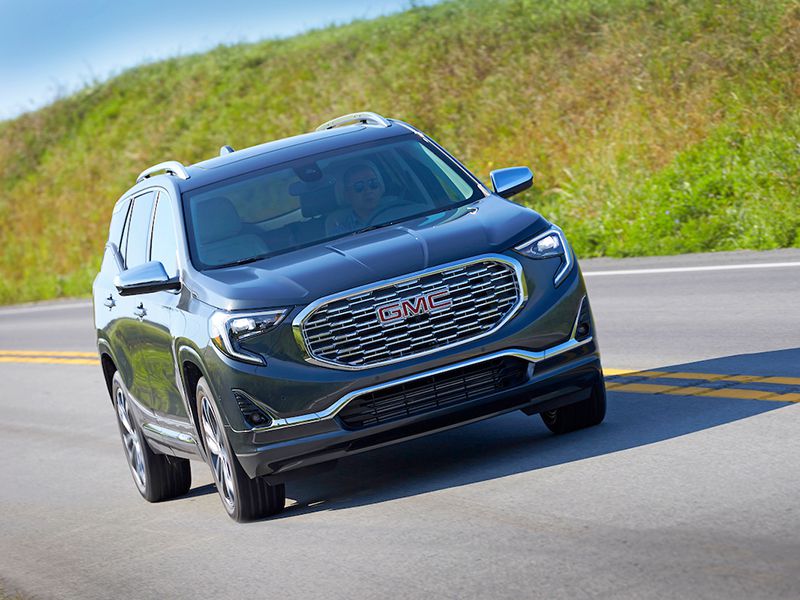
2018 GMC Terrain 3 4 front on the road ・ Photo by GMC
It takes a lot to stand out in the compact crossover/SUV market these days, where a sea of sameness rounds the edges of every entry like pebbles on a sandy beach. The 2018 GMC Terrain might just have what it takes to turn the tide.
While the first-generation Terrain was bland and boxy when it was introduced in 2010, it gained character with the introduction of the high-end Denali trim level in 2013 and a modest refresh in 2016 that featured a more dynamic front fascia. GMC is a premium brand with a unique twist, occupying a prime niche among manufacturers, with a lineup that consists solely of SUVs and trucks.
Therein lies the opportunity. The 2018 model’s thorough exterior redesign catches the eye, but what's available under the hood — a fuel-efficient yet responsive diesel engine — is what makes the Terrain rare among crossovers. With such engines being rare these days, GMC is setting a course where few manufacturers are likely to follow.
Exterior Design
Say goodbye to the chunky old Terrain. GMC’s design team dispensed the slab-sided exterior for 2018, replacing it with a sleeker, more mainstream shape that highlights the trademark GMC grille (with three separate designs for different trim levels). When you roll up in the Terrain, there’s no question which company built it. The design is decidedly aggressive — GMC describes the stamped hood as muscular and the sculpted rear quarters as powerful. The front and rear fascias are enhanced with LED signature lighting that carries GMC’s distinctive C-shape design throughout.
The rear quarter windows are the most controversial element. While the rear quarter design is slick, it does reduce visibility. (If you equip the Terrain with all the available safety features, the visibility argument is moot.) The SL and SLE trims are fitted with 17-inch alloy wheels, the SLT gains 18-inch alloys and the Denali rides on 19-inch wheels.
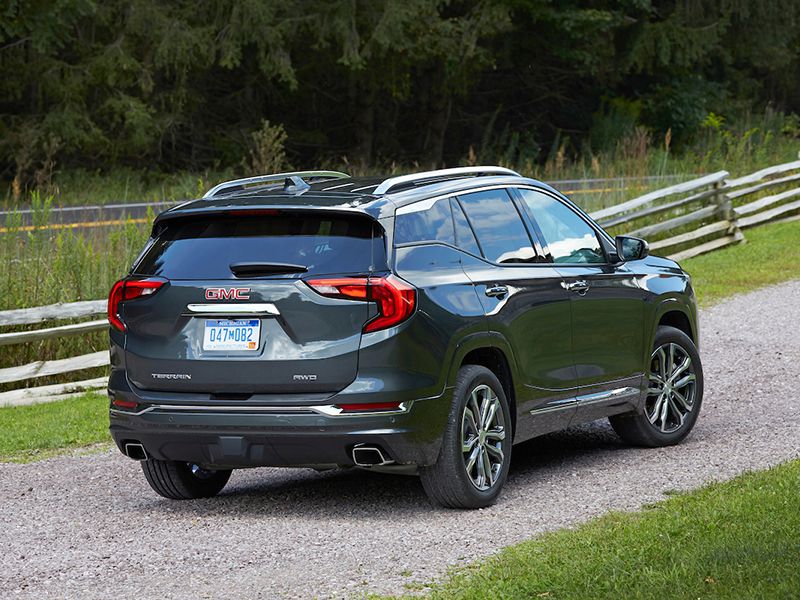
Photo by GMC
Interior
The Terrain’s cabin is wonderfully quiet and nicely appointed. Interior noise levels were reduced through a significantly stiffer body structure, active noise cancellation and range of advanced materials. The diesel model benefits from an acoustic engine cover and a dissipative acoustic dash mat. Passengers are not likely to notice the difference between the gasoline and diesel engines, although the driver will feel a slight bit of vibration through the steering wheel.
The dashboard is soft-touch and includes a thoughtful cubby for passenger’s mobile phone. Relocating the gear selector to the base of the dash achieved a more efficient center console design with side-by-side cupholders and pass-through storage space. While the real aluminum trim is handsome, the Denali’s simulated wood grain trim falls short; an authentic wood trim option would be most welcome. Leather upholstery and heated front seats are standard on the SLT and Denali. The second-row seats are roomy and include a recline feature.
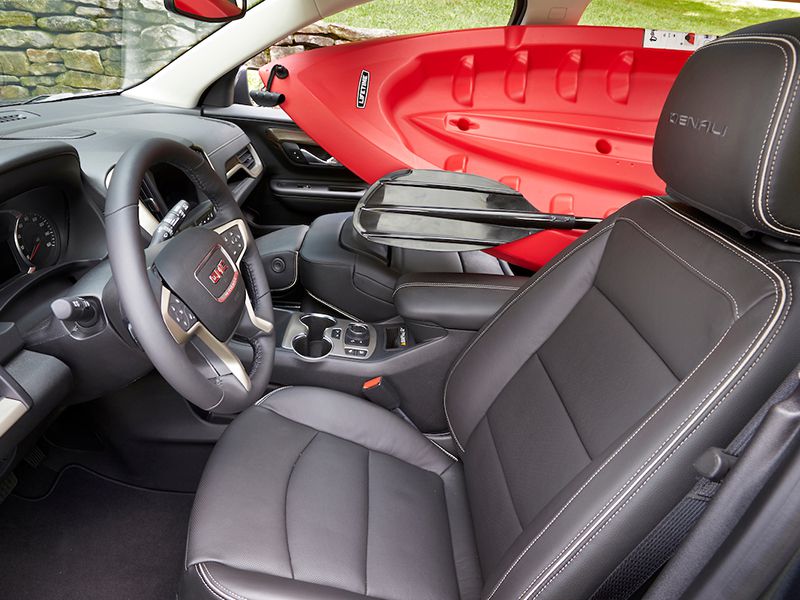
Photo by GMC
Drivetrain
The 2018 Terrain is offered with three turbocharged four-cylinder engines — two gas, one diesel — in front- or all-wheel drive. A 1.5-liter turbo is standard on most trims and produces 170 horsepower and 201 pound-feet of torque. A 2.0-liter cranks out 252 hp and 260 lb-ft of torque and is standard in the Terrain Denali. The optional 1.6-liter turbodiesel produces 137 hp and 240 lb-ft of torque. The gasoline engines are fitted with nine-speed automatic transmissions, while the diesel gets by with a six-speed automatic. The unique precision shifter is mounted at the base of the dashboard, freeing up space on the center console. While the shifter’s push/pull button ergonomics are good overall, shifting manually with the ring finger feels a bit odd.
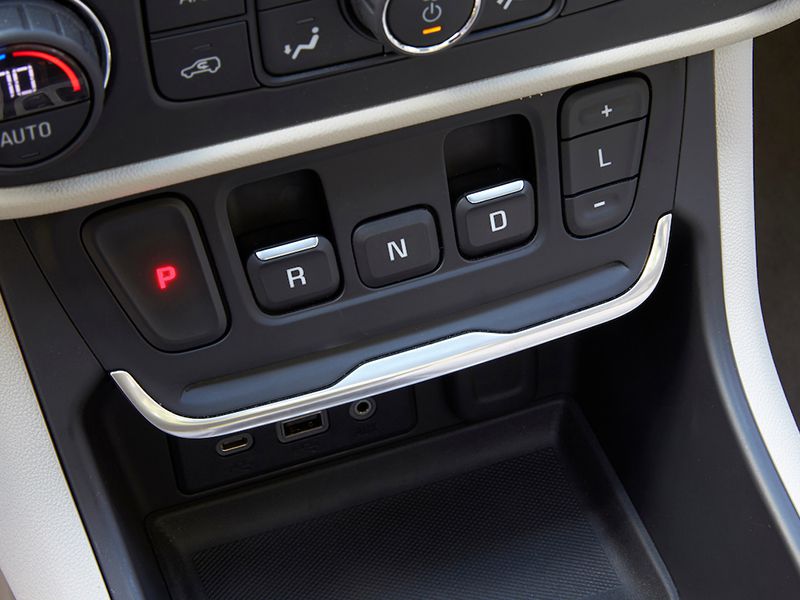
Photo by GMC
Fuel Economy
The 2018 Terrain delivers better fuel economy than its predecessor thanks to significant weight reduction, along with its advanced drivetrains. The 1.6-liter turbodiesel engine is a highway champ, with EPA ratings of 28 city / 39 highway / 32 combined miles per gallon with front-wheel drive and 28 city / 38 highway / 32 combined mpg with all-wheel drive. The 1.5-liter gas engine also delivers solid fuel economy, with an EPA rating of 26 city / 30 highway / 28 combined with FWD and 24 city / 28 highway / 26 combined with AWD.
The high-output turbocharged 2.0-liter gas engine is engineered to run on premium fuel. It carries an EPA rating of 22 city / 28 highway / 24 combined with FWD and 21 city / 26 highway / 23 combined with AWD. While our AWD turbodiesel test car scored slightly under spec in a limited highway test over the hilly highways of western Pennsylvania, the diesel offers by far the lowest cost per mile and the most miles per tank.
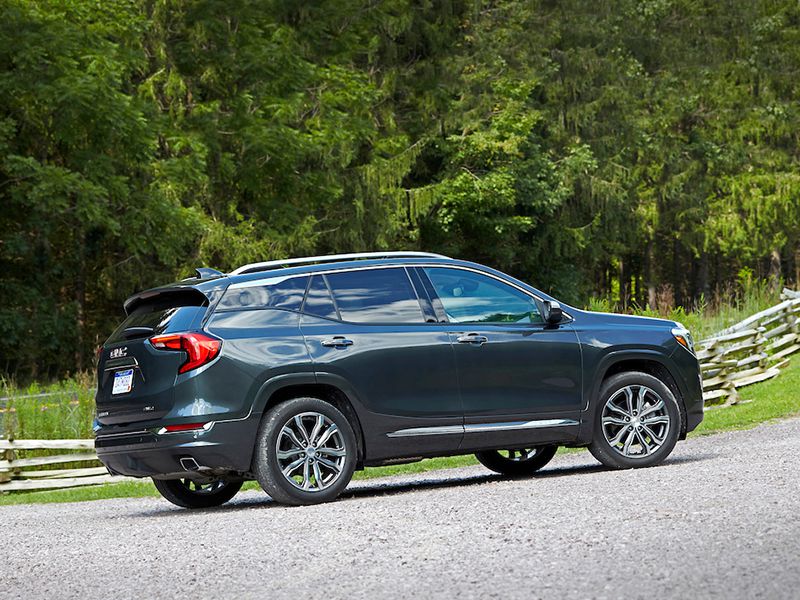
Photo by GMC
Infotainment
General Motors continues to lead the way in connectivity, with a revamped infotainment system and a plethora of ways to plug-in. A 7-inch touchscreen system is standard on the Terrain SL and SLE, while the SLT and Denali are fitted with an 8-inch touchscreen. All models include Apple CarPlay and Android Auto support. The Denali includes a built-in navigation system that includes real-time traffic and route recalculation, along with a handy preview of upcoming highway exits.
Productivity and entertainment options abound with the Terrain’s 4G LTE-enabled Wi-Fit hotspot (with a three-month free trial). Staying connected took some of the sting out of sitting in bumper-to-bumper traffic on the way to the Pittsburgh airport, and the Denali had plenty of USB ports in both rows (two front, two rear). After the trial period ends, OnStar currently offers an unlimited data plan that’s aggressively priced at just $20 per month.
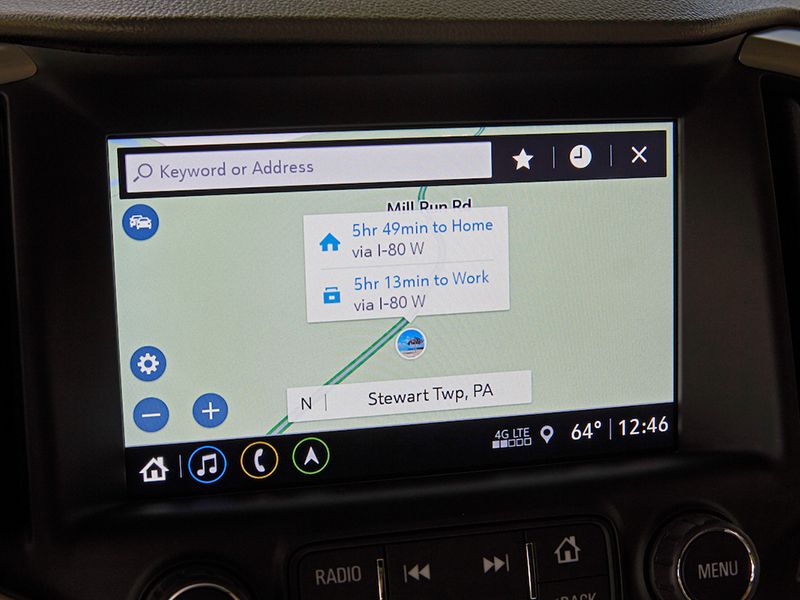
Photo by GMC
Cargo
The 2018 Terrain provides plenty of room to haul the goods, whether you’re headed to the lake or to the big-box store. The second-row seats fold flat via handles on in the cargo area to accommodate large loads, and the front passenger seat folds flat as well. This unique feature allows the Terrain to carry 8-foot-long items in the cabin, whether a bright red canoe (as shown above) or a stack of 2x4x8 lumber. The back of the front passenger seat is covered in hard plastic to hold up to the abuse.
There’s 29.6 cubic feet of cargo space behind the split-folding second-row seats, 63.3 cubic feet with the rear seats folded, and a total of 81 cubic feet with the front passenger seat folded down. A hands-free rear liftgate is standard on the Terrain Denali.
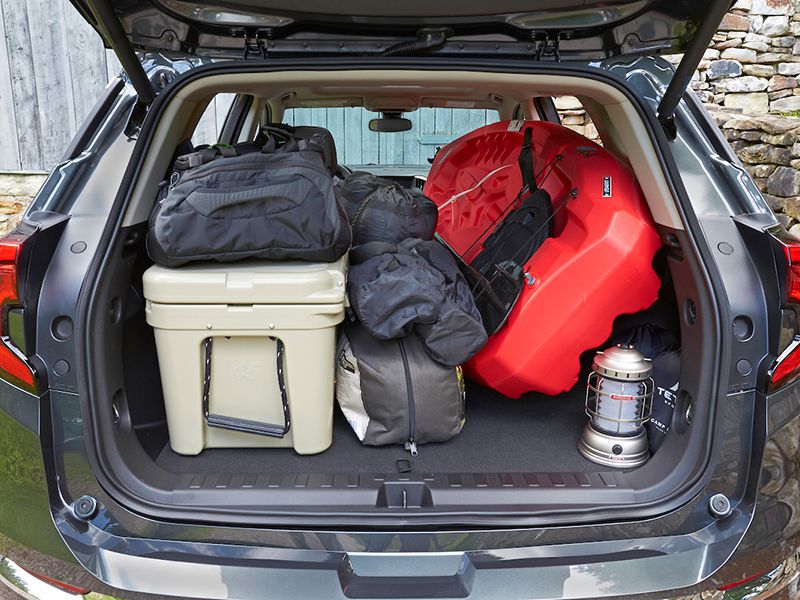
Photo by GMC
Safety Features
The 2018 Terrain offers a full gamut of advanced safety technology — with one notable omission. GMC included a rear camera with rear park assist and rear cross traffic alert, along with blind spot mirrors and forward collision alert in previous models. For 2018, it's added front park assist, automatic parking assist, lane-keep assist, low-speed forward automatic braking, and a following distance indicator. Unfortunately, adaptive cruise control is not currently offered in the Terrain. General Motors may be waiting for its Super Cruise technology to roll out first with Cadillac, before offering it in the less expensive GMC brand. An available surround vision camera system helps the Terrain slip through tight spaces.
Last but not least, the 2018 Terrain includes the marvelously subtle safety alert seat — in place of a conspicuous alarm to warn you about your driving error, your seat vibrates. Your cheeks may buzz, but your significant other will never ask “what’s that?” when you trigger the lane departure alert.
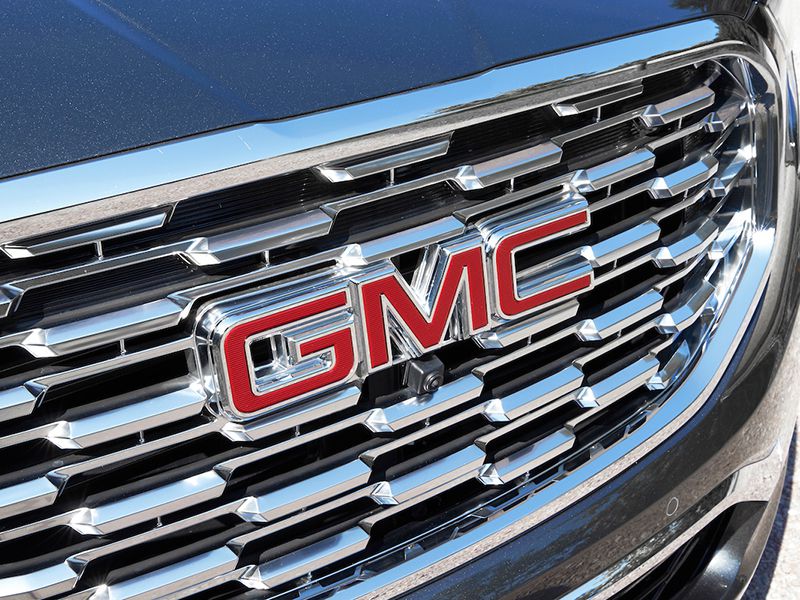
Photo by GMC
Towing
The Terrain is well suited for folks with an active lifestyle, and GMC proudly displayed its stylish new crossover with a handsome Airstream Basecamp trailer at the launch event. If you need to tow with the Terrain, you'll likely opt for the larger 2.0-liter gas engine. The 1.5-liter gasoline engine and 1.6-liter turbodiesel engine have a modest 1,500-pound trailering capacity, while the 2.0-liter gasoline engine can handle 3,500 pounds. The all-wheel drive system includes traction select, with AWD, 2WD, mountain and tow settings.
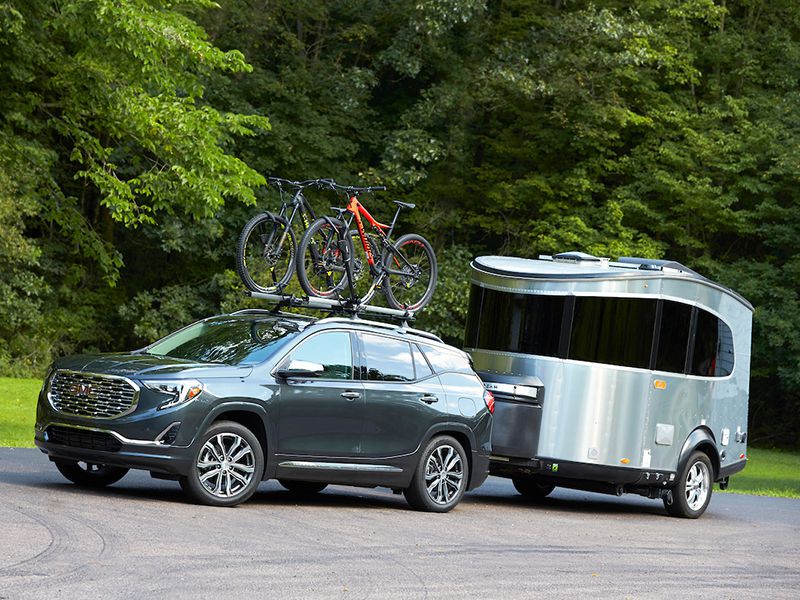
Photo by GMC
Driving Impressions
The turbodiesel-equipped 2018 Terrain delivered a pleasant, comfortable ride in our day-long test on the roads around Pittsburgh. Power was adequate throughout the range and the diesel’s torque was well-suited the rolling hills. The cabin is roomy and feels even larger with the panoramic sunroof. The Terrain was smooth and quiet out on the open highway and delivered a reassuring ride on the twisty back roads. Although we spent much of the day behind the wheel of the SLT diesel, we look forward to putting a conventional gasoline-powered Terrain through its paces in the near future.
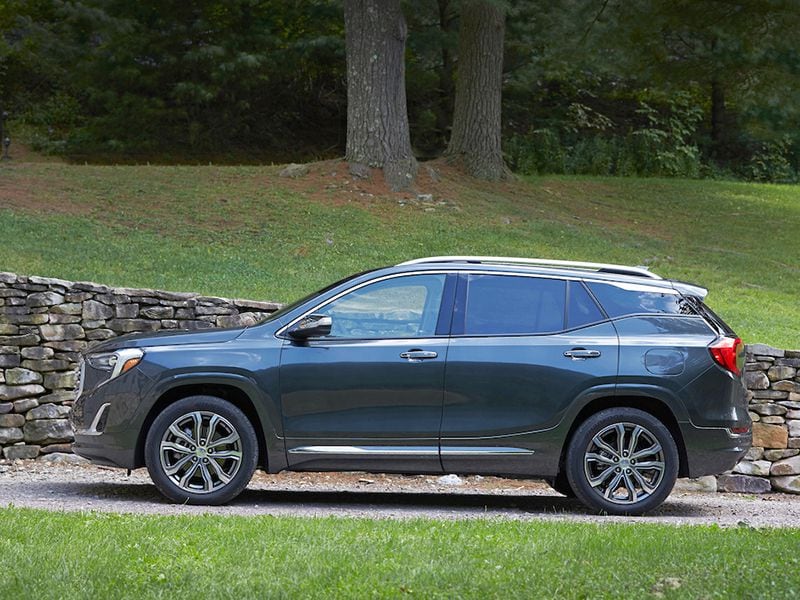
Photo by GMC
Final Thoughts
While GMC retail sales plateaued in 2016, they’ve doubled over the past eight years. The 2018 Terrain should shift the company back into growth mode. Although the new model has smaller dimensions, the interior remains roomy. The exterior sheds its formerly chunky appearance, but the grille — particularly in the Denali — delivers that unmistakably premium GMC presence.
While the Terrain shares its platform with the Chevrolet Equinox, the Denali name sets it apart from both its cousin and the competition. General Motors' turbodiesel-equipped crossovers offer a unique value proposition with a customer base that’s primed to adopt the technology. GMC and Chevrolet Duramax pickup truck owners know the merits of diesel propulsion well and many have been waiting for this day. Diesel’s combination of torque and efficiency is tough to beat.
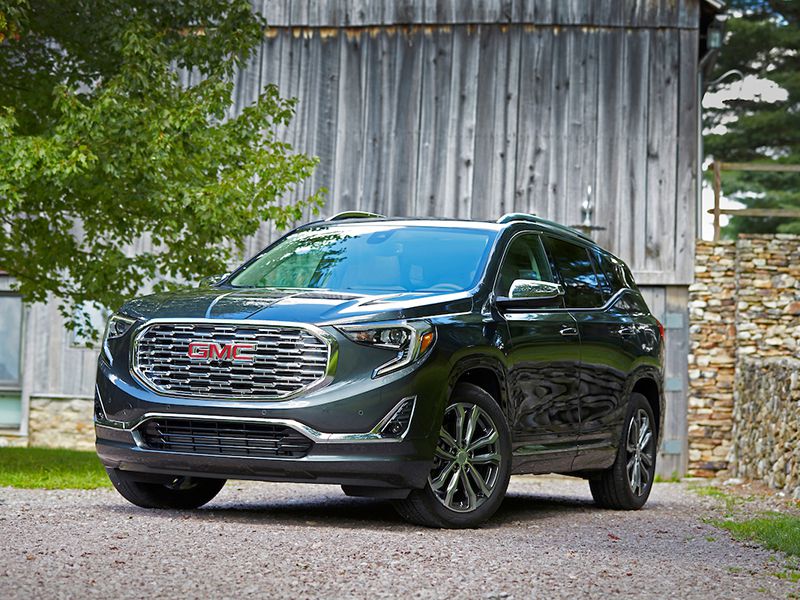
Photo by General Motors